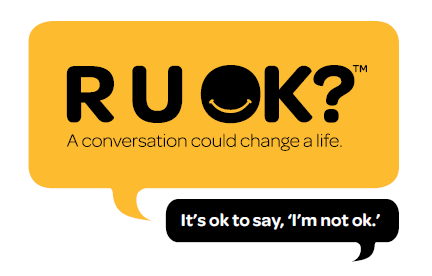Men’s Mental Health: The Importance of Asking R U OK?
Mental health is just as important as physical health, but it’s often overlooked in men. Men are less likely to seek help for mental health problems than women, and they are more likely to die by suicide. This is due to a number of factors, including the stigma associated with mental illness and the belief that men should be strong and stoic.
We hear common phrases like ‘chin up’, ‘pull your socks up’, and the like, and we’ve been taught that many ‘head issues’ are nothing to worry about and should be dismissed. There is growing recognition that mental health concerns are serious issues, and the culture of dismissal is a dangerous approach. However, many men are still unaware of some of the most common indicators that there’s a problem that should be dealt with before it grows into something bigger. Moreover, men need to feel comfortable to talk with each other about their mental health so they get the help they need. This can be as simple asking a friend, ‘R U OK?’
Which is where R U OK? Day comes in. It is an annual campaign that aims to raise awareness of men’s mental health and encourage people to ask their friends, family, and colleagues R U OK?. Founded in Australia in 2009, it has since grown into an international movement. This year R U OK Day is on 14 September.

The stigma of mental illness
One of the biggest barriers to men seeking help for mental health problems is the stigma associated with mental illness. Men are often seen as being strong and stoic, and they may feel that they will be judged or ridiculed if they admit to having a mental health problem.
This stigma can be very real and can prevent men from seeking the help they need. It is important to remember that mental illness is a real and treatable medical condition, and there is no shame in seeking help.

The belief that men should be strong
Another barrier to men seeking help for mental health problems is the belief that men should be strong. This belief is often reinforced by the media and by society as a whole. Men are often portrayed as being tough and unemotional, and they may feel that they will be seen as weak if they admit to struggling with their mental health.
It is important to remember that men are just as capable of experiencing mental health problems as women. There is no shame in being vulnerable and asking for help.
Signs of mental health problems in men
Some common signs of mental health problems in men include:
- Changes in mood, such as feeling sad, anxious, or angry
- Changes in behaviour, such as withdrawing from friends and family, or engaging in risky or destructive behaviours
- Changes in sleep patterns, such as sleeping too much or too little
- Changes in appetite, such as eating too much or too little
- Changes in energy levels, such as feeling tired all the time or having difficulty concentrating
- Increased or new use of alcohol or drugs
- Thoughts of suicide or self-harm

Tips for reaching out to your friends:
Men’s mental health is important, so if you think someone is going through a hard time, take a moment to ask ‘R U Ok?’
If you’re worried about a mate’s mental health, or just see that they are going through a hard time, take a moment to ask ‘R U Ok?’. Let them know that you’re there for them and that you care.
Here are some tips for reaching out to a mate about their mental health:
- Be direct and ask them how they’re doing.
- Listen without judgement.
- Let them know that you’re there for them and that you care.
- Offer to help them find professional help if they need it.

Here are some things you can do to support men’s mental health
- Talk about mental health. The more we talk about mental health, the less of a stigma it will have. Talk to your friends, family, and colleagues about mental health and let them know that you are there for them if they need support.
- Ask R U OK? The simple question “R U OK?” can make a big difference. Ask your friends, family, and colleagues R U OK? on a regular basis, even if they seem to be doing well.
- Encourage men to seek help. If you know a man who is struggling with his mental health, encourage him to seek professional help. Let him know that you are there for him and that you support him.
- Get involved in men’s mental health initiatives. There are many men’s mental health initiatives that you can get involved in. These initiatives can help to raise awareness of men’s mental health and provide support to men who are struggling.
What if it’s you that needs help?
If you are a man who is struggling with your mental health, please know that you are not alone. There are people who care about you and want to help. Please reach out to someone you trust or contact a mental health professional.

Need mental health support?
Get the support you need through the following free services:
Mosh Mental Health Support Online - Visit
Lifeline: 24/7 crisis support. Ph: 13 11 14 or visit
Beyond Blue: Counselling support - 1300 22 4636 or visit
Suicide Call Back Service: 1300 659 476 or visit
Black Dog Institute: Visit for a range of support services
SANE Australia Helpline: 1800 18 SANE (7236) or visit
MensLine Australia: 1300 78 99 or visit





